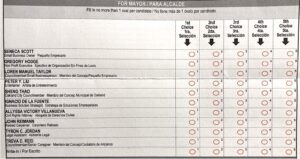Oakland, CA — In the past decade in ranked-choice voting elections across the country, thousands of citizens’ votes have been discounted and thrown away causing corruption and expensive runoffs for cities. While ranked-choice voting was initially instated to make elections more accessible, it is proving to be a more complex and layered democratic practice.
When a lack of proper voter education exists in any democracy, citizens and candidates face the repercussions; particularly in a state like California where a ranked-choice voting system is employed in many counties. Some say politicians are at fault, whereas others argue the voters are. What is the story of ranked-choice voting? Who benefits? Who is impacted? And what is the solution to its complexity?
In November 2022, Oakland held its seventh mayoral election optimizing the use of ranked-choice voting. Ten candidates campaigned for the position, but the two leading faces confronted the heaviest positive and negative repercussions of the voting process: current Mayor Sheng Thao and former Council Member Loren Taylor. In a race lost by just 677 ballots, the importance of adequate voter education resurfaced as a community conversation and raised questions about how impartial Alameda County’s democratic process truly is.
Previously referred to as instant-runoff voting, a ranked-choice voting system allows voters to appoint their officials in order of preference, versus standard voting which only permits each voter to vote for one candidate. Ballots list all candidates and number their selections one through five adjacent to the names. Voters then fill in the circle corresponding to the rank they want that candidate to be in office. If a candidate wins 50%+ of first-choice ranked votes, they will be declared the winner.
On the contrary, the candidate with the fewest first-choice votes is eliminated from the running, and all second-choice votes become first-choice if the failed candidate is placed first on any ballots. This process is repeated until one candidate remains. Ballot counting can continue for weeks, and different candidates may lead the race at various times.
States such as Alaska and Maine use this system on all federal ballots, whereas smaller cities such as San Francisco and Oakland utilize it in their respective counties. Florida, Idaho, Montana, South Dakota and Tennessee have federally banned ranked-choice voting.

While seemingly complicated, ranked-choice voting offers many advantages. For candidates, there is less of an incentive to run a negative campaign that steers hatred at another candidate, as the election is no longer a binary race.
In addition, ranked-choice voting eliminates runoffs. Runoffs are separate elections between two to three candidates that have no definite winner in their initial election. The race is between those select candidates and is treated like any other election. For states and counties, no runoffs mean less taxpayer money going to separate elections, which can often be an expensive investment. However, for individual citizens, the difficulties surrounding ranked-choice voting often outweigh the benefits.
“Ranked choice voting still is frustrating to me, and doesn’t seem to have been very effective. I felt disenfranchised in many ways because of the way that the ballots were tossed by people not understanding,” Tina Monaco, a longtime Oakland resident of District 2, said.
More than 2,000 ballots were discounted in the Oakland School Board and Mayoral election of 2022 due to a lack of sufficient voter education on the process of ranked-choice voting. Common mistakes included: ranking one candidate first through fifth and refusing to rank the rest of the contestants, refusing to rank any candidate for first choice or solely ranking one or two candidates.
Runner up in the 2022 Oakland Mayoral election and former councilmember, Loren Taylor is no stranger to the democratic process of ranked-choice voting. “In this past election, [there were] 10 mayoral candidates, so it’s unreasonable to expect one person to have the time, the energy, and the capacity to really understand all 10 candidates and order them in an ideal way that aligns with their interests, their needs and what they want to have represented,” he said.
Throughout his candidacy as a councilmember, Taylor had expressed concerns about the implementation of ranked-choice voting in Alameda County. Despite this, he motioned to oppose California State Assembly Bill 2808 in March 2022 which would federally prohibit ranked-choice voting. Current Oakland Mayor Sheng Thao seconded that motion.
Equity issues with ranked-choice voting surface in regard to how financed a campaign may be. Some candidates believe that due to name recognition through advertisements, television commercials or yard signs from candidates that do not represent their first or second choice, voters are more inclined to list them higher on their ballots. By the nature of ranked-choice voting, that belief implies that those candidates have significantly higher chances of winning, even if they are not among the most popular first-preference votes. With so many candidates and campaigns to follow, ranked-choice voting requires informed decisions from citizens which is not always realistic.
No county or state mandates voter education in schools or registering to vote, forcing citizens to engage themselves on their own. Non-partisan and impartial voter education makes information surrounding the election accessible and assists voters in making informed decisions. Voter education’s purpose includes every demographic and offers comprehensive information to all. However, most do not receive that level of education.
“In terms of learning how to vote, I don’t know the exact step-by-step but, I know I have to bring my ID, and I have to register to vote,” Eliana Fassil ’24 said. Like Fassil, most citizens have never received formal education on how to properly exercise their voting rights.
“Our system of civic engagement and democracy highly depends on you, knowing how to engage, right? It’s not a system that does that engagement. For folks, it is not a system that inherently educates and makes sure that as soon as you are eligible to vote, you know what to do,” Pecolia Manigo, Political Director of Oakland Rising and third-place candidate for Oakland School Board, said.
Manigo faced the implication of improper voter education in her campaign. Some voters did not fill out a first-choice option on their ballots, causing a technological issue in the computer’s ballot counting. She was informed she finished the race in second place but was moved to third weeks later.
But who is to blame for the inadequate education surrounding elections? According to Manigo, the Secretary of State is responsible. “There’s just not a lot of education on what rank choice voting can and should be doing. There’s just an assumption that somehow [citizens will] figure it out.”
Shirley Weber, California’s Secretary of State, has not created any initiatives thus far in her second term to support her campaign promises around the broadening of election participation.

Historically, lack of national or federal government involvement has not prevented activists from fighting for their right to democracy. In 1962, the Voter Education Project was established as a part of the Southern Regional Council to expand voter resources, education and participation among Black voters. This project, later taken over by former United States congressional representative John Lewis increased the votership of more than 1.5 million Black Americans in the succeeding presidential election.
Similarly, there are many efforts to expand voter education and participation in the Bay Area and beyond.
Oakland Rising, a local nonprofit, creates opportunities for predominantly BIPOC, previously incarcerated, working-class and immigrant citizens to engage in voter’s rights workshops and lectures. While based in Oakland, their website also has many resources for voters living in other places in the country where ranked-choice voting is employed. In addition, Loren Taylor recently launched his nonprofit, Empower Oakland, which focuses on voter engagement, education and activation.
“I firmly believe that having a more educated and aware electorate will help ensure that the folks elected best represent [the public] and also that the policies that are in place are most reflective of the values, the will, and the outcomes that the residents are looking for,” Taylor said.
Ranked-choice voting can be very effective and straightforward, if properly educated and supported, but can create severe injustices within the democratic process, if not. A citizen-led movement has been created to re-evaluate the system of ranked-choice voting in Oakland for the 2024 mayoral election, but no government policy has been introduced yet.
“[Ranked choice voting] might be more scientifically and theoretically perfect. But if you focus on that, and you end up losing a lot of people along the way, are you really serving the intent of our democratic process?” Taylor asked.
As states, cities and counties hold local elections in upcoming years, the decision of whether government officials should implement or continue ranked-choice voting amidst the potential democratic risks remains.






